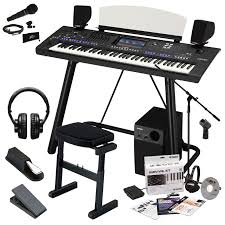 GENOS with Accessory package |
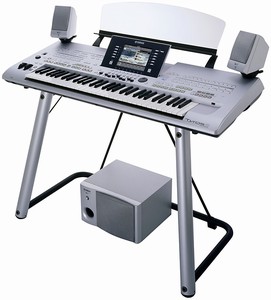 Tyros5 with Speakers |
If you just bought a GENOS or one of the Tyros models, you may have purchased your keyboard with a whole "kit" of extras. The GENOS kit shown on the right includes a keyboard stand, bench, speakers, earphones, pedals, microphone and more.
The Tyros5 model is shown bundled with Yamaha speakers. The Yamaha speakers are not included with the high-end arrangers. You must provide speakers for your Genos or Tyros keyboard. They can be Yamaha speakers or any brand you prefer. You may already own speakers that you can use. (See more about speakers below.) Yamaha also has a stand for the Tyros/Genos, which is not included. You can use the Yamaha stand or a wide variety of other commercial stands, also discussed below.
The mid-range models have built-in speakers. But you still may want to purchase a separate set of speakers particularly if you are planning on performing in larger rooms.
Before we get started on playing your keyboard, let's consider some of the accessories you may want to have with your Yamaha keyboard.
Keyboard Stands
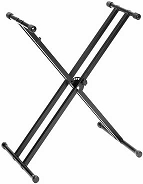 There are a wide variety of Keyboard stands available on the market and they do vary in price.
They also vary in stability
and strength. While your keyboard may not be very heavy, if you tend to "pound"
those keys, the keyboard may bounce around a bit on the more inexpensive
stands. Actually, the sturdier the better. The Yamaha stand shown on the Tyros model above is
certainly very sturdy, but it does not fold up nor is it adjustable.
There are a wide variety of Keyboard stands available on the market and they do vary in price.
They also vary in stability
and strength. While your keyboard may not be very heavy, if you tend to "pound"
those keys, the keyboard may bounce around a bit on the more inexpensive
stands. Actually, the sturdier the better. The Yamaha stand shown on the Tyros model above is
certainly very sturdy, but it does not fold up nor is it adjustable. 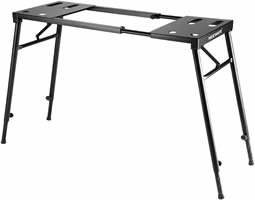 If you
want to transport your set up, you may want a stand that you can fold and
easily take along with you.
You may also want a stand that you can adjust
the height to a level that you are comfortable with. You do not even really
"need" a keyboard stand -- you could put your keyboard on a desk
or table. This would give you a very firm foundation, but it would limit
where you could move your keyboard. If you have more than one keyboard, you
could purchase stands that are built to hold more than one keyboard. Generally,
you will find these keyboard stands in music stores or on the internet.
If you
want to transport your set up, you may want a stand that you can fold and
easily take along with you.
You may also want a stand that you can adjust
the height to a level that you are comfortable with. You do not even really
"need" a keyboard stand -- you could put your keyboard on a desk
or table. This would give you a very firm foundation, but it would limit
where you could move your keyboard. If you have more than one keyboard, you
could purchase stands that are built to hold more than one keyboard. Generally,
you will find these keyboard stands in music stores or on the internet.
Keyboard Bench
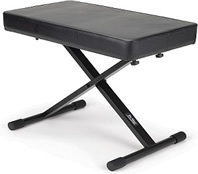 While some players prefer to stand at their
keyboard while they play, most owners sit down. Therefore,
you will also need a bench or a chair. A standard chair may be too low. If
you have a piano bench, that would be excellent. You could purchase a "portable" piano
bench like the one shown here with an adjustable height so you can set the bench position where you
feel most comfortable. I have a couple of these benches and they work quite well.
While some players prefer to stand at their
keyboard while they play, most owners sit down. Therefore,
you will also need a bench or a chair. A standard chair may be too low. If
you have a piano bench, that would be excellent. You could purchase a "portable" piano
bench like the one shown here with an adjustable height so you can set the bench position where you
feel most comfortable. I have a couple of these benches and they work quite well.
Music Stand
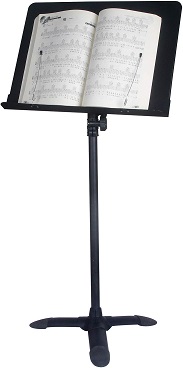 All of the Yamaha keyboards come with a Music Rest. However, these are simply
inserted in a groove on the mid-range models. If your keyboard is bouncing
around as you play, rest assured, that the music stand will, eventually,
bounce right out of that groove. It can also seem a bit flimsy if you have
one of those giant fake books on it. The Tyros music rests fit into slots
on the back of the keyboard and are more secure, but they are also set back
a few more inches from the player. If you do use music books, you may want
to consider a separate music stand as an alternative. These tend to be sturdy
metal stands that will easily handle any of your music books and can be positioned
behind the keyboard for convenient viewing. If you are handy in the workshop,
you might want to take a look at Phil Hall's article "Industrial
Strength Music Rack" and see how you can build a stronger rack yourself.
If you need additional light on that music, there are some nice portable
music gig lights you can buy. Check out the Pro Clinic discussion on Music
Lights.
All of the Yamaha keyboards come with a Music Rest. However, these are simply
inserted in a groove on the mid-range models. If your keyboard is bouncing
around as you play, rest assured, that the music stand will, eventually,
bounce right out of that groove. It can also seem a bit flimsy if you have
one of those giant fake books on it. The Tyros music rests fit into slots
on the back of the keyboard and are more secure, but they are also set back
a few more inches from the player. If you do use music books, you may want
to consider a separate music stand as an alternative. These tend to be sturdy
metal stands that will easily handle any of your music books and can be positioned
behind the keyboard for convenient viewing. If you are handy in the workshop,
you might want to take a look at Phil Hall's article "Industrial
Strength Music Rack" and see how you can build a stronger rack yourself.
If you need additional light on that music, there are some nice portable
music gig lights you can buy. Check out the Pro Clinic discussion on Music
Lights.
Speakers
If you are playing at home for yourself, the built-in speakers in the mid-range models may very well be all that you need. They produce excellent results and will be loud enough in your study, family room, or bedroom. Of course, in the bedroom, you may want to be using ear phones!
If you plan to entertain
others, or if you just like your music to be a bit louder, you will want
more powerful speakers. Many users have found the Logitech Z-5500 model to
be good choice (see Gary Diamond's article "Travelin-Easy
with the Z5500" and Warren Peter's article "Installing
the Z-5500 on My 3000").  These have also been used as the basis
for some home-made speaker systems (see Posey's articles "POZ
P1 Speaker System" and "POZ
PII Logitech Conversion").
These have also been used as the basis
for some home-made speaker systems (see Posey's articles "POZ
P1 Speaker System" and "POZ
PII Logitech Conversion").
 The Logitech Z-5500 has since been replaced by the Logitech Z906 5-1 surround sound speaker system (shown on the left). At the high-end, the Bose L1 compact
system (shown on the right) has received rave reviews providing a balanced sound level to audience
members close to the performer as well as those far from the performer. Check
out the PSR Tutorial Forum for many comments on the Bose L1 and other speaker
systems.
The Logitech Z-5500 has since been replaced by the Logitech Z906 5-1 surround sound speaker system (shown on the left). At the high-end, the Bose L1 compact
system (shown on the right) has received rave reviews providing a balanced sound level to audience
members close to the performer as well as those far from the performer. Check
out the PSR Tutorial Forum for many comments on the Bose L1 and other speaker
systems.
PA System
I recently discovered an article on the "Best PA System for Guitar Players." While written for guitar players, I suspect much of the information would be equally useful to keyboard players looking to set up their own PA System, defined by the article as:
"A P.A. system consists of PA speakers, microphones, audio controller (mixer), cables, and stands. You can use this kind of setting for live music venues, as well as a home studio and studio settings. Aside from that, there are other applications for a P.A. system like public speaking, karaoke, conferences, auditorium classes and more."
The article includes an extensive tutorial on all the components of a PA system and suggestions for the 10 Best systems.
Foot Pedals


iPhone/iPad
According to the newest PSR-SX owners manual:
You can use a smart device, such as an iPhone or iPad, with the instrument for a variety of musical purposes by connecting it to the instrument. By using application tools on your smart device, you can take advantage of convenient functions and get more enjoyment out of this instrument.
Visit the Yamaha Keyboard Apps page to see some of the many applications available.
Unless your keyboard is newer than the PSR-3000 or the Tyros, another accessory you will certainly want is a USB flash drive. In the next lesson, we'll discuss these wonderful devices for storing your files. If you have a PSR-2000, or PSR-2100, feel free to jump ahead to Keyboard Panels.
This page updated on February 15, 2024 .